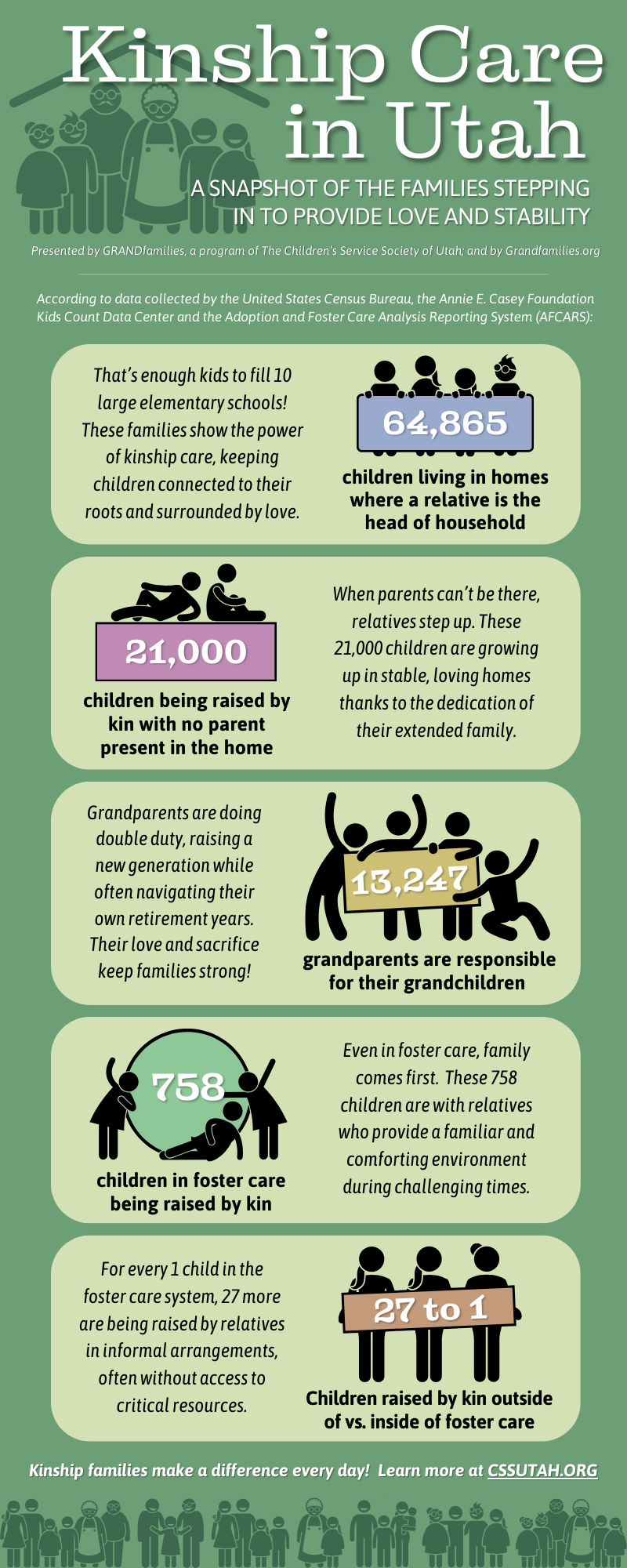Facts about Kinship Care
Kinship care is a vital but often unseen part of child welfare. In Utah alone, tens of thousands of children are being raised by relatives, keeping them connected to family and culture. The infographic below highlights key facts about kinship families in our state, showing the impact of their love and dedication:

GrandFacts Fact Sheets
The GrandFacts State Fact Sheets for grandfamilies include state-specific data and programs, as well as information about public benefits, educational assistance, legal relationship options, and state laws. Visit grandfamilies.org to find this, and all GrandFacts State Fact Sheets.
Follow this link for the Utah Fact Sheet.
Kinship Care FAQ's
Have questions about kinship care? Below are answers to some of the most common questions, along with resources to help kinship families as you take on this responsibility.
What is kinship care?
Kinship care refers to the full-time care of children by relatives or close family friends when their parents are unable to care for them. This arrangement helps maintain family bonds and provides a sense of stability for the child.
Who can be a kinship caregiver in Utah?
In Utah, kinship caregivers can include:
♦ Non-custodial parents
♦ Relatives such as grandparents, great-grandparents, aunts, uncles, siblings, and cousins
♦ Stepparents and stepsiblings
♦ Close family friends or godparents
For a detailed list, visit the Utah Division of Child and Family Services’ kinship care page.
What are the benefits of kinship care?
When a child can no longer stay with their parents, kinship care offers several advantages, including:
♦ Maintaining family connections and cultural traditions
♦ Providing a sense of stability and continuity for the child
♦ Reducing trauma associated with placement in unfamiliar settings
♦ Experiencing fewer school changes and better behavioral and mental health outcomes
What are the challenges commonly faced by kinship caregivers?
Common challenges include:
♦ Navigating legal and bureaucratic systems
♦ Accessing financial assistance
♦ Managing the child’s emotional and behavioral needs
♦ Balancing caregiving responsibilities with personal commitments
GRANDfamilies offers support groups and counseling services that can help to address these challenges.
What support services are available for kinship caregivers in Utah?
GRANDfamilies offers various support services for kinship caregivers, including:
♦ Case management
♦ Educational workshops
♦ Support groups
See our Services page for more information.
Are there financial assistance programs available for kinship caregivers in Utah?
Yes, kinship caregivers in Utah may be eligible for financial assistance programs such as Temporary Assistance for Needy Families (TANF), Supplemental Nutrition Assistance Program (SNAP), and Medicaid. Our GRANDfamilies Family Advocates can help you connect with the programs you may qualify for. For caregivers who join our program, we can offer additional support and resources, including holiday gifts and school supplies. Contact us to find out more!
Do kinship caregivers need to become licensed foster parents?
In Utah, while it’s not mandatory for kinship caregivers to become licensed foster parents, obtaining a license can provide access to additional support services and financial assistance. The Utah Foster Care website offers guidance on the licensing process.
How can I legalize my status as a kinship caregiver?
Legalizing your status will most often be done through the court system. As part of our Case Management services, our GRANDfamilies Family Advocates can assist with providing information on all your options, from power of attorney, to guardianship, to adoption. It’s advisable to consult with a family law attorney to understand the best options for your situation. The Utah Division of Child and Family Services also provides resources on legal options for kinship caregivers.
Are there training programs available for kinship caregivers?
Yes! GRANDfamilies offers a 10-week psychoeducational program designed specifically for kinship caregivers. Led by experienced family advocates, these classes address common challenges and provide valuable guidance in a supportive group setting. While caregivers gain practical tools and peer support, separate groups for children and adolescents ensure the whole family feels included and connected.
In addition, Utah Foster Care offers training sessions that provide insights into the kinship family experience, potential situations, solutions to common problems, and other relevant topics.
How can I connect with other kinship caregivers for support?
GRANDfamilies offers multiple ways for kinship caregivers to find support and connection: Our 10-week psychoeducational course provides a strong foundation for caregivers, while our weekly virtual Grief & Loss support group, led by a clinical team member, offers a safe space to process emotions and find encouragement.
Families who complete our 10-week course are also invited to Friend 2 Friend (F2F) events, monthly gatherings designed to foster connection through fun activities, workshops, and community-building experiences. These events help strengthen family bonds and provide ongoing support for both caregivers and children.
How can I join the GRANDfamilies program?
To get started, contact us to schedule an intake appointment.
Remember, all the services we offer are funded by grants and donations so they are always FREE to kinship caregivers. There is no reason not to call!
Phone: 801-326-4409
Email: grandfamilies@cssutah.org

